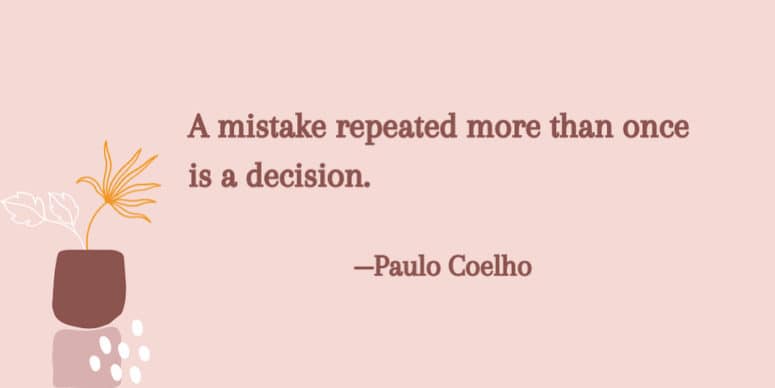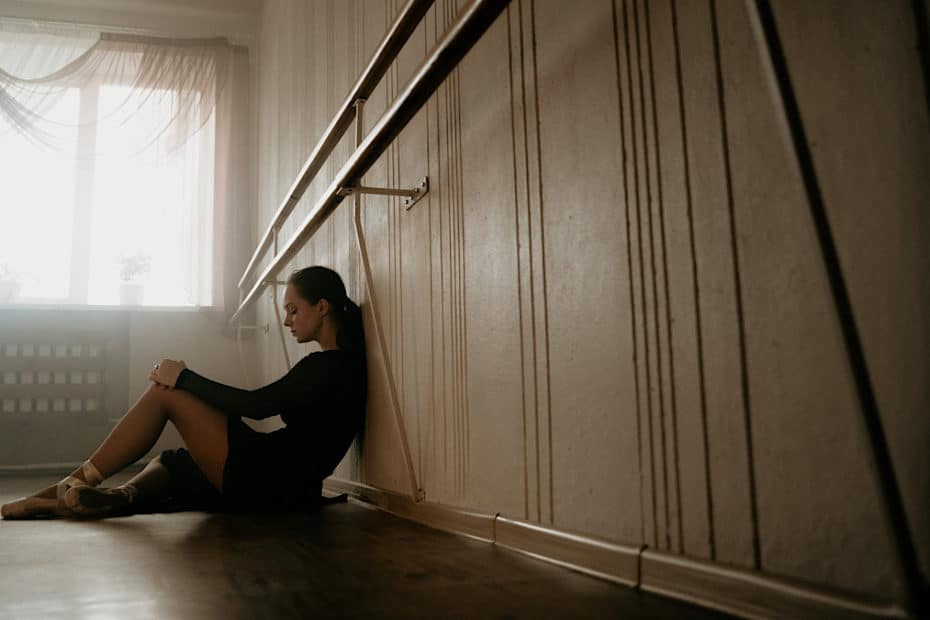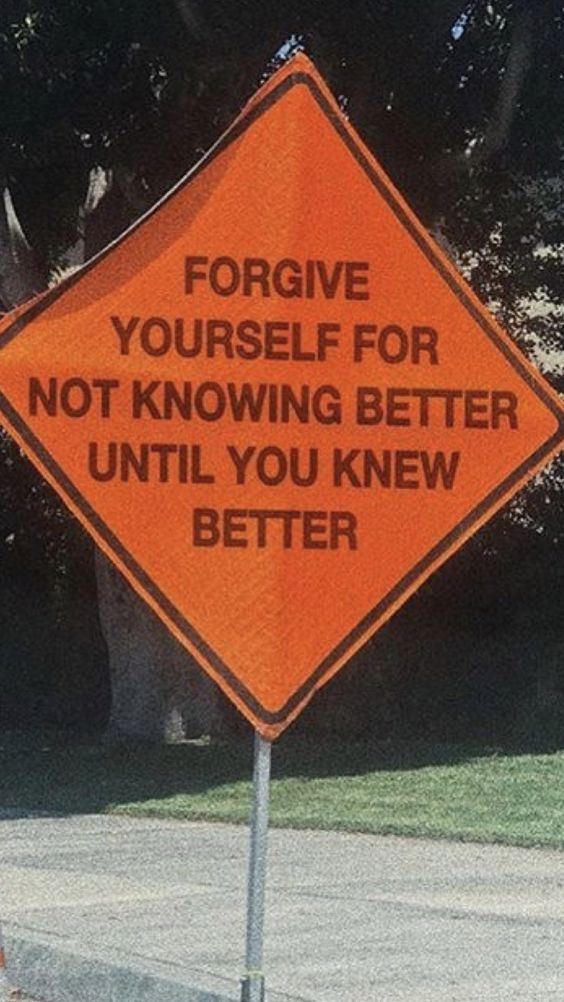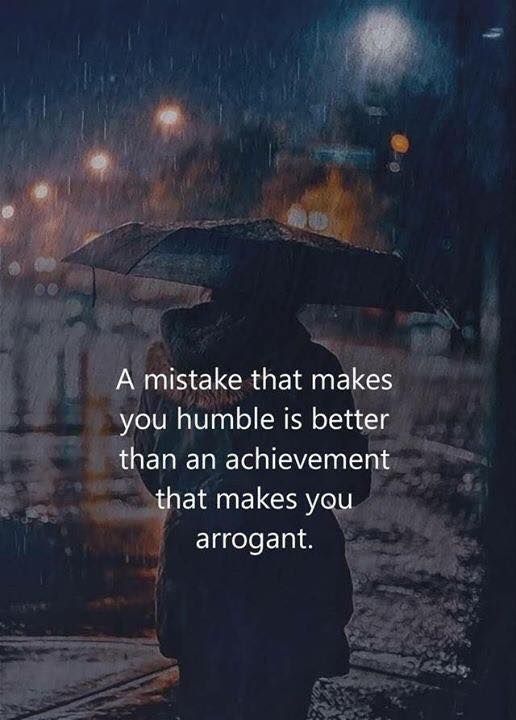37 Transformative Quotes On Failure To Consider For Your Success
Excerpt: Failure isn’t losing—it’s learning. Those who live by this principle succeed more. Our 37 quotes on failure will transform your perspective.
Read More »37 Transformative Quotes On Failure To Consider For Your Success
“Whenever anything negative happens to you, there is a deep lesson concealed within it, although you may not see it at the time. Even a brief illness or an accident can show you what is real and unreal in your life, what ultimately matters and what doesn’t.”
Eckhart Tolle, The Power of Now (Page 178) | Read Matt’s Blog on this quote ➜
Neil Gaiman Quote on the New Year and How He Hopes You Make Mistakes
“I hope that in this year to come, you make mistakes. Because if you are making mistakes, then you are making new things, trying new things, learning, living, pushing yourself, changing yourself, changing your world. You’re doing things you’ve never done before, and more importantly, you’re doing something.”
Neil Gaiman
Beyond the Quote (Day 366)
With a new year comes an opportunity for a fresh start. Of course, we can choose to start fresh whenever we want—the opportunity is always only one decision away. But, when the clock strikes midnight and the year switches over, it feels only natural to begin anew with the great reset of time on our calendars. And if you can align yourself with this great renewing, like a surfer aligning themselves with the coming of a great wave, then you may be able to enjoy a great ride of momentum heading into your new year.
Read More »Neil Gaiman Quote on the New Year and How He Hopes You Make Mistakes“Committing many mistakes, one learns what is a mistake and how not to commit it. Knowing what is error, one comes closer and closer to what is truth. It is an individual exploration, you cannot depend on others’ conclusions.”
Osho, Courage (Page 16)
“That is one of the problems: people have been taught never to do anything wrong, and then they become so hesitant, so fearful, so frightened of doing wrong, that they become stuck. They cannot move, something wrong may happen. So they become like rocks, they lose all movement. Commit as many mistakes as possible, remembering only one thing: don’t commit the same mistake again. And you will be growing.”
Osho, Courage (Page 12)
“It is better to start as a fool and learn from your mistakes than to fake being a genius and ignore your errors.”
James Clear, Blog
“To make mistakes is human. To own your mistakes is divine. Nothing elevates a person higher than quickly admitting and taking personal responsibility for the mistakes you make and then fixing them fairly. If you mess up, fess up. It’s astounding how powerful this ownership is.”
Kevin Kelly, Blog
“Find people you admire and ask how they got where they are. Seek book recommendations. Add experience and experimentation on top of this. Put yourself in tough situations. Accept challenges. Familiarize yourself with the unfamiliar. That’s how you widen your perspective and your understanding. The wise are still because they have seen it all. They know what to expect because they’ve been through so much. They’ve made mistakes and learned from them. And so must you.”
Ryan Holiday, Stillness is the Key (Page 66)
“Our progress is paved with mistakes, failures, and defeats, and it’s our resilience that keeps us keeping on. Every misstep is a teacher, and not all the things and people we lose in life end up being losses. Our obsession with winning can cost us much more than losing a healthy outlook when life doesn’t go our way. There’s always a lesson, a nugget of wisdom or a jewel waiting when things look like they won’t be going in our favor; we just have to be willing to pay attention and do some digging if need be. Once we remind ourselves to find opportunity in any situation, there is no loss, just learning. Failure isn’t the opposite of success, it’s a path to it.” ~ Humble the Poet, Things No One Else Can Teach Us (Page 268)
“Life is trial and error, and culture is a collection of some of our best practices handed down from generation to generation, but even they aren’t one-size-fits-all. We have to make our own mistakes to figure everything out. When we were kids, we had to bump into something before we stopped running in the house; we had to burn our hands before we stopped playing with the stove. And now, we gotta get our assess kicked a few dozen times before we get the hang of whatever the rest of this life is.” ~ Humble the Poet, Things No One Else Can Teach Us (Page 267)
Things No One Else Can Teach Us [Book]
Buy from Amazon! Listen on Audible!
Not enough time to read entire books? Check out Blinkist and get the key insights from popular nonfiction books in a fraction of the time. ‘Busy’ isn’t an excuse.
Post(s) Inspired by this Book:
- 17 Humble the Poet Quotes about Comparing Yourself to Others (and How To Stop)
- Humble the Poet Quote on Emotional Intelligence and How To Deal With “Less Desirable” Emotions (Beyond the Quote 237/365)
- Humble the Poet Quote on Reducing Social Media Usage (Beyond the Quote 86/365)
- Humble the Poet Quote on Managing Expectations and Going From “High” to “Low” to “None” (Beyond the Quote 79/365)
- Humble the Poet Quote on Comparing Ourselves To Others (and Why That Can Be Dangerous) (Beyond the Quote 77/365)
- Albert Camus Quote on The Invincible Summer Inside (Beyond the Quote 65/365)
- How To Separate Actions from Identity—An Important Excerpt from Things No One Else Can Teach Us.
Leo Babauta Quote on Using Mistakes As Feedback
“Use mistakes as feedback. They’re not signs that you’re a bad person or have no discipline. They’re signs that you need to adjust.”
Leo Babauta, Essential Zen Habits (Page 71)
Beyond the Quote (39/365)
In his book, Essential Zen Habits, Leo Babauta shares a simple story about mistakes that might help you shift your paradigm from looking at mistakes as catastrophic failures to seeing them as opportunities for indispensable feedback. Imagine you are walking across a pond using a small stone path. It’s not the most stable path and it zig zags across the water, but can none-the-less get you to the other side. If you wanted to get to the other side safely and dry, you would have to carefully place each step and make the proper balance adjustments along the way (I believe in you).
Read More »Leo Babauta Quote on Using Mistakes As Feedback“Leadership decisions are inherently challenging and take practice. Not every decision will be a good one: all leaders make mistakes. No leader, no matter how competent and experienced, is immune from this. For any leader, handling those mistakes with humility is the key. Subordinates or direct reports don’t expect their bosses to be perfect. When the boss makes a mistake but then owns up to that mistake, it doesn’t decrease respect. Instead, it increases respect for that leader, providing he or she possesses the humility to admit and own mistakes and, most important, to learn from them.” ~ Jocko Willink, Extreme Ownership (Page 287)
“No matter how exhausted from an operation or how busy planning for the next mission, time is made for this debrief because lives and future mission success depend on it. A post-operational debrief examines all phases of an operation from planning through execution, in a concise format. It addresses the following for the combat mission just completed: What went right? What went wrong? How can we adapt our tactics to make us even more effective and increase our advantage over the enemy? Such self-examination allows SEAL units to reevaluate, enhance, and refine what worked and what didn’t so that they can constantly improve. It is critical for the success of any team in any business to do the same and implement those changes into their future plans so that they don’t repeat the same mistakes.” ~ Leif Babin, Extreme Ownership (Page 208)
“Memory is a tool. Memory is the past’s guide to the future. If you remember that something bad happened, and you can figure out why, then you can try to avoid that bad thing happening again. That’s the purpose of memory. It’s not ‘to remember the past.’ It’s to stop the same damn thing from happening over and over.” ~ Jordan Peterson, via 12 Rules for Life (Page 239)
“People create their worlds with the tools they have directly at hand. Faulty tools produce faulty results. Repeated use of the same faulty tools produces the same faulty results. It is in this manner that those who fail to learn from the past doom themselves to repeat it. It’s partly fate. It’s partly inability. Its’s partly… unwillingness to learn? Refusal to learn? Motivated refusal to learn?” ~ Jordan Peterson, via 12 Rules for Life (Page 75)





